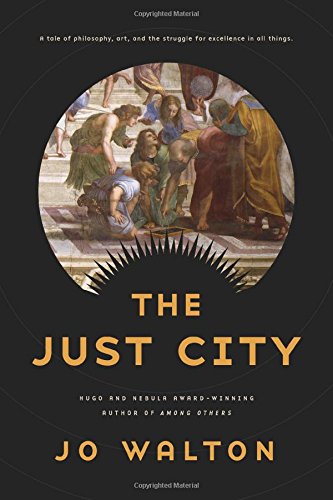[alert variation=”alert-info”]Publisher: Tor Books
Formats: Hardcover, Kindle, eBook
Purchase: Powell’s | Amazon | IndieBound | Barnes & Noble | iBooks[/alert]
Athene is eternal. And so are the pleas of humanity, pleas that she listens to and contemplates with the patience and weight of an immortal. Humans want happiness on earth, utopia in physical form. But how to answer their supplications? Time-traveling from ancient Greece to the 21st century, Athene gathers a mélange of philosophers, gods, artists, lonely hearts, slave children, and even some mindless worker machines from the far future to populate and propagate the island of Atlantis. Their mission? To grow, to prosper, to live in peace and harmony. To create utopia.
These characters are presented in first person perspective chapters, each one chauffeuring us through the eyes of a different actor. Apollo is forced to consider how his lust impacts his potentially unwilling partners. Klymene has to face her fears from both wild pigs and wild men. Starry-eyed Simmea and sheltered Maia, as women in a new world, are forced to synthesize their newfound freedoms with some of the hard-edged realities of their respective utopias. Sokrates asks the right questions, but along the way he might have just set spark to the tinder of revolution among the robot workers. Can robots achieve sentience? Do they then have souls? Where do souls come from?
“Know yourself.”
Unless a scholar by profession, most readers will be familiar with only a handful of Greek and Roman legends and not remember a lot of the mytho-historical detail behind more than a few of the main players. That gives the author, Jo Walton, a lot of elbowroom to re-arrange the furniture and the landscape without disturbing your sense of the story. Walton herself is a scholar on these matters, and uses her setup to re-establish these lost personalities in the mind of the modern reader. The Just City could be seen as a life raft sent out to these lost gods… one appropriately filled with scantily clad women and lots of well watered wine.
It is one also filled with philosophy and a tribute to rhetoric. Jo Walton credits Mary Renault as her inspiration for this book and the roots are clearly there. Walton is as obsessed as Renault with the full context of human experience. Hope, in the light of suffering. Delight, in the depths of despair. And the constant questioning of “why are we here?” Whether Sokrates himself is positing the questions, or any one of the other cast members reflecting on their own experiences, all roads lead back to “What is the meaning of life?” It is hard to feel by the end of the story that Walton hasn’t somehow shed more light on these eternal ruminations.
One difference between the two authors is that Walton brings a sense of levity to her mytho-history. Her writing is buoyed by humor, sometimes obvious in her wordplay, and sometimes more esoteric. For instance, Plato pointed to Athens as his example of utopia and identified mythical Atlantis as his imprimatur of dystopia. Walton’s placement of Plato’s Just City in this antipodal setting is a touch of satire presented almost with a wink and a nod.
Speaking of Atlantis, most of us are familiar with the legend of that doomed island, and from the beginning you know that ultimately this story is going to end quite badly. This adds a wonderful tension to the reading that is effective because the author makes you care about her characters to such a degree that you will hold onto a desperate hope that they will somehow survive, that the experiment will succeed, that the future can be changed, or at the very least that your friends will escape on a wind-runner vessel, flying away ahead of the storm.
Drop in on old Atlantis. Spill the wine. You’ll be glad that you did.
[signoff predefined=”Social Media Reminder” icon=”twitter”][/signoff]

